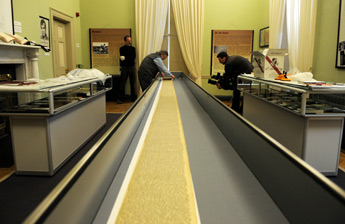Unit
Five Blog Post
For
this blog post, I want to talk about “Revising,” which is chapter five of
Joseph Harris’s book, Rewriting, How to Do Things with Text. In this
chapter, Harris writes about how rare it is that first drafts are instantly readable,
despite media depictions of it. Harris states, “[t]his one-draft view of
writing is reinforced by most movie and TV depictions of writers at work, as we
watch them quickly type perfectly balanced and sequenced sentences until, with
a sigh of satisfaction, they pound out THE END or press SEND” (100). Harris is correct
that this rarely happens. This is why I think that the fifth response paper is
a good exercise for this class. Nobody is a writing wizard right off the bat.
Unless of course, you are actually a wizard. By the way, let’s give a big shout
to wizards! Literature, legends, Renaissance festivals, and online computer
customer service would be much boring places without them.
There
is a well-known real-life exception to Harris’s comments about the one draft
writing style shown in media. Famously, Jack Kerouac’s iconic novel On the
Road was typed on a massive scroll. Here are some pictures of this below.
And here is a recreation of what it was like when it
was first unfolded.
Even through the scroll of On the Road is
legendary in literature, Kerouac did do some revisions to it for the final
completion of On the Road. Even Kerouac knew about the power of editing.
Here is a link about the scroll below:
Harris writes about how important revising, editing, proofreading is to achieve
the creation of a polished text. Harris’s discussion about the importance of
these things in literature reminded me of the literary centered hashtag #ThanksForTyping.
Bruce Holsinger, a professor at the University of Virginia, noticed how many
acknowledgment pages in books had mentions of the author’s wives typing, transcribing,
proofreading, and editing the books. Many times, the authors would just thank
their wives without even stating their names! So Holsinger went to Google
Books, took screenshots of these acknowledgments and posted them to Twitter
under the hashtag # ThanksForTyping. Here
is the link to it:
So why is #ThanksForTyping
important? Well, because it shows that many women (mostly wives) in their
editing, transcribing, and proofreading of materials, have helped shaped and
refine some of the greatest works of literature while being underrated or even
uncredited entirely. It’s about finally giving these women their due. Here is
an article about how the literary oeuvres of Tolstoy, Eliot, Nabokov, Wordsworth,
Fitzgerald, etc, were helped by the women in their lives. Here is the link to
article:https://theconversation.com/thanksfortyping-the-women-behind-famous-male-writers-75770
Wait, there more! I actually have my own list of
underrated female literary contributors.
1. Sylvia
Beach
Beach published one of the most
acclaimed books of the 20th century, James Joyce’s Ulysses.
Here is a link about this:
Beach’s bookstore, Shakespeare &
Company is still in business in Paris, France. The current owner of Shakespeare
& Company, Sylvia Whitman, gave a tour of the
bookstore to the comedian Craig Ferguson, back in 2011. The tour of the
bookstore begins at the 2:34 mark. Here is the link to the video below:
2. Eileen
Blair
Blair was the wife of George Orwell.
Her family members have stated that she was a contributor to his works. She
might also be a pioneer of dystopian fiction through her poetry. Here are the links below:
3. Alma Reville
Alfred Hitchcock is justly remembered as the one of greatest directors of time. His wife Alma, a writer and editor, was a constant contributor to his body of cinematic works.
4. 1. Margaret
Warrington
Warrington was Stanley Kubrick’s
secretary. I’m giving Warrington a mention here for a reason. You know the “all
work and no play makes jack a dull boy” segment in Kubrick’s The Shining?
Well, Warrington typed the phrase out…on
500 pages.
So I leave you with some
questions. What do think about #ThanksForTyping? What do you think about On
the Road or any of the other literature that is mentioned in this blog post?
Let’s get talking!





I love #ThanksForTyping and the important work it does. So often women's labor (esp. wives' labor) has gone unacknowledged. And I had NO IDEA that someone typed those pages in The Shining out. I mean, I guess I should have realized that, but wow!
ReplyDeleteI once heard that Michael Crichton rewrote his novels three or more times each. I did some research to find that he was large proponent of rewriting. He said that knowing all the plot holes and readability while you’re writing was impossible. He also said it’s a pain in butt but rewriting is essential to good writing. What Crichton was talking about was writing a draft of and then actually rewriting it. Not going back to edit or restructure, but having the story so imbedded in ones mind that one is capable of rewriting it from start to finish with only minor glances at one’s first draft when one feels lost. Editing isn't that bad. I don't know why Crichton opted not to.
ReplyDeleteI have never heard of this, but I love it! What a neat perspective to take on in this blog post. Thanks for the fantastic contributions Alexandra! I really think the #ThanksForTyping is crucial in understanding Harris's points of revising, editing, and proof reading. Exercises such as Response Paper 5, peer reviews, and brainstorming are good examples as well of what Harris is explaining regarding the importance of this process. It is so cool that this hashtag exemplifies a part of this process, too! Thanks so much for sharing. (Unit 5 comment
ReplyDelete#ThanksForTyping is important because it gives women the recognition they deserve for editing major pieces of work! It was really nice that you added in your own list acknowledgements for some female contributors. What a time consuming process!
ReplyDeleteI had never heard about #ThanksForTyping before, and I am so glad I finally have! However, I am not at all surprised to hear these stories. I think that it is so natural to share your writing with your closest companions in life, because it allows you to get an outside perspective while still remaining somewhat insulated from the harsh storms of society. I share a lot of my writing (even my blog posts for this class) with my boyfriend, and he always gives me good feedback. one of my favorite forum posts to read was actually the acknowledgements thread. We are nothing without the people who love and care for us (and our creations!).
ReplyDelete